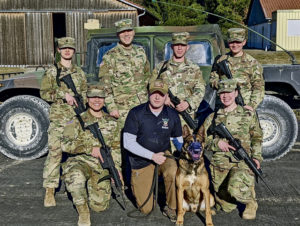
On March 13, 1942, the Army founded the K-9 Corps and began training a highly motivated force to serve among the brave men and women in defense of this nation. The anniversary of this occasion, today better known as K9 Veterans Day, commemorates the service and sacrifices of American military and working dogs throughout history.
“Military working dogs are incredibly important to the mission because they have senses that you can’t replicate with machines,” said Spc. Zoe Gillespie, animal care specialist with 64th Medical Detachment (Veterinary Services Support), 421st Multifunctional Medical Battalion, 30th Medical Brigade.
Working dogs have been used by the U.S. Army dating as far back as WWI, where they served a crucial role in delivering messages between troops.
Today, it is not uncommon to hear the heroic stories of military dogs such as Conan, who in 2019 helped to eliminate al-Baghdadi, then leader of the Islamic State; or Maiko, whose service in 2018 in Afghanistan saved the life of his handler and several other Army Rangers at the expense of his own life.
“To sum it all up, it’s about loyalty,” said Sgt. James Romer, non-commissioned officer in charge of the Veterinary Medical Surgical Team. “If a handler gets injured and can’t go on, often the dog will not leave his or her side. A lot of the time, they might have to be sedated to be taken away from their handlers.”
Today’s incredibly motivated canine Soldiers hail from a long lineage of dogs who have served with unwavering dedication and loyalty.
For Maj. Shawn Thomas, veterinarian and officer in charge of the VMST, taking care of these working dogs is his top priority.
On large-scale deployments, role 2 medical teams generally take care of working dogs on the front lines. “But when there are issues, then they’re going to need to refer them to higher levels of care — and that’s us,” said Thomas.
In addition to providing higher levels of care for MWDs who are injured on duty, the 64th MDVSS also conducts routine training with dog handlers in garrison environments to ensure the best care is available.
“We want to be there,” said Thomas. “We want to help them have a safe deployment, help them return to duty, and help them finish their career and have a good life.”
Since April 2021, the 64th MDVSS has instructed several K-9 Tactical Casualty Combat Care courses to multiple allied NATO partners including Greece and Turkey to further a common understanding of how to best treat injured working dogs in real combat scenarios.
This K-9 Veteran’s Day, supporters can adopt a retired service dog or give to their local animal shelters.


